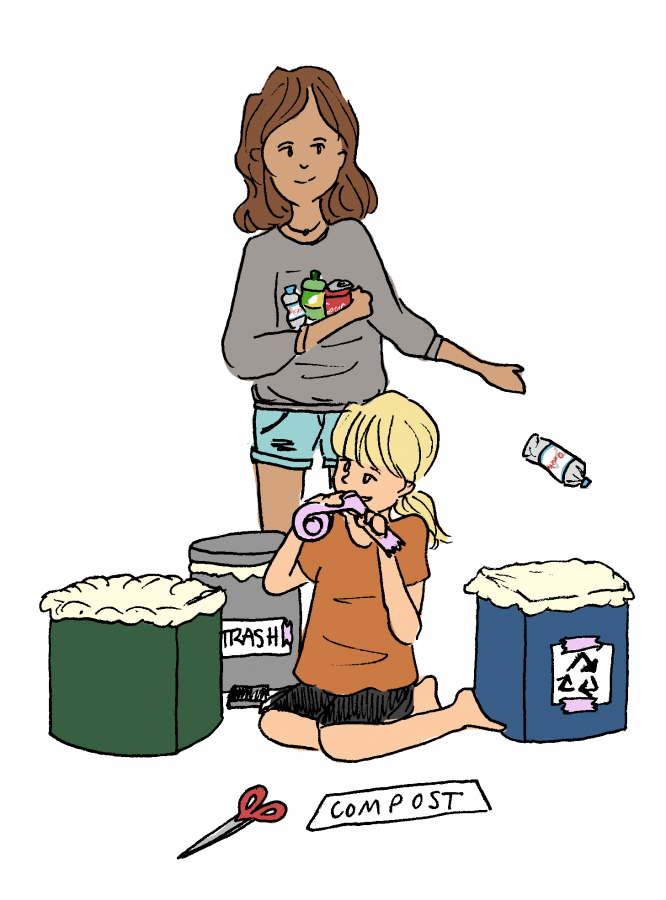The first difference I noticed between life in Austin versus life in Missouri City was that stores in Austin do not give you plastic bags.
It’s a small difference, but it’s one of the few things I admire about my University and this city. I’ve never seen people so environmentally conscious. People here bike often, and Austin has public transportation. Believe it or not, my home city has virtually no public transportation system. People here regularly talk about sustainability and buy locally sourced food from UT Farm Stand. And who knew there could be five different types of trash cans?
Why do I say all of this? Because I am truly impressed by this city and our University’s zero waste efforts, sustainable living and environmentally friendly campus. But that doesn’t mean there aren’t areas we could improve.
We aren’t capitalizing on composting and recycling efforts like we could be because we pay outside contractors to compost and recycle our waste for us. Instead, UT should create its own self-operating waste service system.
Economically, paying outside contractors to recycle and compost our waste isn’t a smart long-term investment.
“What (University Housing and Dining) pays for composting and recycling, that’s around tens of thousands of dollars and … probably close to $100,000 a year,” said UHD sustainability coordinator Neil Kaufman.
Our neighbor, Texas State, “diverted 57 tons of organic waste from the landfill and reduced University costs and fuel usage through fewer waste hauls,” according to the Texas Commission on Environmental Quality website. A portion of the generated compost is used in outdoor classrooms and on campus landscapes while a student group sells the remainder to community gardens, according to the website.
Composting is also catching on at sports venues across the country. The Mariners’ Safeco Field stopped 2.4 million pounds of waste from entering landfills in 2014 by composting 85% of all stadium food waste. In total, they saved $131,000 in disposal costs. Imagine the savings if our sports stadiums and UHD could compost and recycle their waste without outsourcing the task to a fee-for-service provider.
UT could even make a profit off its compost, since compost is a tradable good. Some United States companies export their made-in-the-USA compost to foreign countries to alleviate depleted soil. Some trade is interstate, too.
Additionally, there is the benefit of control.
“I think with any contract service, there are going to be some challenges, whether it’s communication or reliability or whatever it is, so we lose a little bit of control when we pay another company to do a service,” Kaufman said.
Outside companies may not be as accurate at reporting how much is really recycled and composted. Waste invoices are commonly riddled with inaccuracies, new fees and charges and rising costs.
There is an educational benefit to UT creating its own recycling and composting facilities too.
“Students could benefit by having greater access to these facilities at two different capacities,” Kaufman said. “Students could visit and learn from them as a research lab and as service learning. There are many ways students could learn in a deeper way that we couldn’t necessarily do with contract services.”
For example, in one research project at Texas State’s composting facility, “students created 90 yards of compost worth $2,500,” according to the Texas Commission on Environmental Quality. While composting through the campus created a profitable product, more importantly students learned how to be leaders in the waste-management industry, save money and make a measurable environmental impact.
These educational benefits do not come just to sustainability studies and environmental majors.
“The recycling and composting facilities would be places for students to learn and even be a part of the worldwide movement for sustainability,” said architectural engineering sophomore Austin Vargas. “I love the idea and would be proud to be at a university that finds this important enough to implement into the community.”
Plenty of schools besides Texas State have made the switch already.
“Off the top of my head, I know Stanford University has a recycling facility on campus, and Arizona State University has a composting facility,” Kaufman said.
While UT is certainly ahead of my own hometown in the environmental sphere, we’re behind other universities. It’s time to catch up and make an investment not only in our University but in our students.
Marlatt is an international relations and global studies freshman from Missouri City, Texas.





















